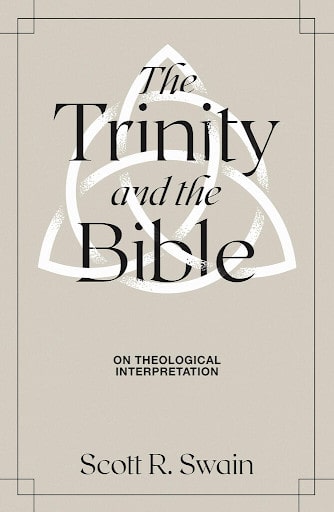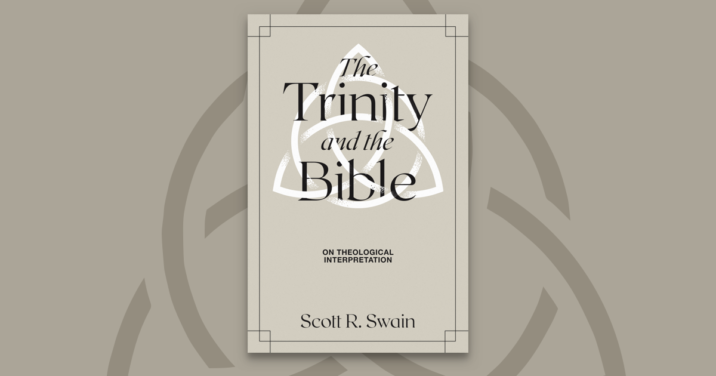
The Bible is the product of the triune God through which he (mysteriously) adumbrates and attests his self-presentation to his people. This, in part, is what it means to affirm that the Bible is in the Trinity. Turning toward our focal question about how the Trinity is in the Bible requires that we attend more closely to the mode of God’s self-presentation in holy Scripture.
The Trinity does not present himself to us in holy Scripture in the specific words of the Nicene-Constantinopolitan Creed. Some, of course, claim this as evidence that the Trinity does not present himself to us in any form in the Bible and that the Church’s Trinitarian dogma is the product of later, extrabiblical influences on its thinking, life, and liturgy.
Wilhelm Bousset argued that it was only when the Church had forgotten its Jewish monotheistic roots that it could, under the influences of its Hellenistic context, affirm the deity of Jesus Christ. The Church’s Trinitarian dogma, according to this view, is “a work of the Greek Spirit on the soil of the Gospel,” to use Adolf von Harnack’s famous description. Martin Hengel and others have undermined Bousset’s sharp distinction between an early Palestinian form of Christianity and a later Hellenized form. Richard Bauckham and Larry Hurtado, representatives of what Hengel dubbed the “new history of religions school,” have further discredited Bousset’s theory, demonstrating that the early Church identified Jesus with and worshiped Jesus as the one true God of Israel.
The suggestion that Greek philosophical influences drove the church to a Trinitarian confession is, at any rate, highly implausible. As Mark Edwards observes, “The paradoxical notion of three persons, each identical with the one God but none identical with the other two, is one that no philosopher would have permitted to ensnare him if he were entirely free to choose his own premises.” Something else must have pressed the church to confess a triune God.
The Church confesses the Trinity on the basis of holy Scripture. If we admit, though, that the Trinity does not present himself to us in the Bible in creedal form, where does that leave us? And what is the relationship between the biblical form of God’s triune self-presentation and the creedal form of the church’s Trinitarian confession?
Recent studies suggest different ways of thinking about the presence of the Trinity in the Bible. According to Ben Witherington and Laura Ice, the New Testament provides “raw data” that the Church later synthesizes in the form of a “developed doctrine of the Trinity.” Matthew Levering appeals to Witherington and Ice’s metaphor to describe the Trinitarian theology of Thomas Aquinas. According to Levering, “Aquinas draws upon the ‘developed doctrine’ as elaborated by the Fathers and by his medieval predecessors and as enunciated by the Church’s creedal formulations” and “sapientially illumines” the raw data of “the New Testament’s revelation of the Trinity . . . with contemplative clarity that, by purifying our knowing, crystallizes (as it were) the steps of the mystical dance revealed in Christ who, through the Spirit, invites our participation in the inexhaustible life of the Father.”
The Trinity is in the New Testament, according to Fee, not as fully developed doctrine but as “experienced reality.”
Employing a slightly different idiom, Gordon Fee describes Paul as a “latent Trinitarian,” whose experience of God through Christ and the Spirit affords him “new and expanded ways of talking about God as Savior—while at the same time rigorously maintaining his monotheism.” The Trinity is in the New Testament, according to Fee, not as fully developed doctrine but as “experienced reality.” While Fee agrees that Paul’s experience of the Trinity informs later creedal statements of the doctrine, he warns us not to “spend our labors on the ontological questions in such a way as to lose the essential narrative about God and salvation that raised those questions in the first place.”
Is the Trinity in the Bible?
According to Witherington and Ice, Levering, and Fee, then, the Trinity is in the Bible in an undeveloped form. On this construal, the task of Trinitarian theology in relation to the Bible is to develop what is undeveloped without destroying the natural narrative habitat that generated the undeveloped form of the doctrine in the first place.
In a short essay devoted to Paul’s teaching about God in Romans and Galatians, Richard Hays suggests an alternative construal of the presence of the Trinity in the Bible. While Hays acknowledges that Paul “did not know the doctrinal formulae worked out in the fourth-century Church’s theological reflection about the one God in three persons,” he argues that Paul’s “prayers, praises, and narratives about . . . God point to the same complex reality with which the ecumenical councils later grappled.” The relationship between the mode of the Trinity’s presence in the Bible and the mode of the Trinity’s presence in the creeds is not, according to Hays, a relationship between raw data and developed doctrine.
Drawing on the work of Frances Young and David Ford, Hays argues that the relationship between the Trinity in the Bible and the Trinity in the creeds is similar to the relationship between the fluent speaker of a language and the theoretical grammar of that language. As Hays explains, “A person does not need to know theoretical grammar constructs in order to speak grammatically. In fact, it is the reverse: ‘Grammar’ is developed to explain the linguistic practices of those who speak a complex language with unreflective fluency. In the same way, the later doctrine of the Trinity is an attempt to describe and analyze the way in which Jesus Christ and the Spirit had ‘become intrinsic to Paul’s way of referring to God.’”
Hays’s metaphor correlates well with Oswald Bayer’s conception of theology as a “grammar of the language of Holy Scripture.” Trinitarian theology, according to this conception, is commentary on and reflective analysis of the primary and normatively fluent Trinitarian language of holy Scripture. . . . What we have in the Bible is not merely an experience of the Trinity or the as yet undeveloped raw data of Trinitarian reflection. What we have in the Bible is well-formed Trinitarian discourse: primary, normative, fluent. More specifically, we have the triune God’s self-naming in the form of the Spirit-inspired prophetic and apostolic testimony to that self-naming.
The Trinitarian theology of the Church’s creeds, proclamation, and liturgy, therefore, is not a refinement of or an improvement on God’s self-naming in Scripture. It is rather the Church’s attempt, in prayerful thought and speech, to follow the divine Word as it leads us out of the misery of idolatry into the happiness that lies before us in the vision of the triune God.
***

Scott R. Swain is the is president and James Woodrow Hassell Professor of Systematic Theology at Reformed Theological Seminary in Orlando, Florida. He is also author or editor of several books, including Trinity, Revelation, and Reading, Retrieving Eternal Generation, and The Trinity: An Introduction.
***
Praise for The Trinity and the Bible
Is the classical doctrine of the Trinity a biblical truth? In this richly rewarding book, Swain shows that the answer is a resounding yes. —Matthew Levering, James N. and Mary D. Perry Jr. Chair of Theology, Mundelein Seminary
Deeply informed, cogently argued, and elegantly written. —Fred Sanders, Torrey Honors College, Biola University
Scott Swain is among the foremost scholars working on the doctrine of the Trinity in the present-day, and The Trinity and the Bible brings together some of his important contributions over the years. It is a must-read for those interested in the doctrine specifically and theological interpretation more broadly. Swain offers exemplary material for both. —Madison N. Pierce, Assistant Professor of New Testament, Trinity Evangelical Divinity School






